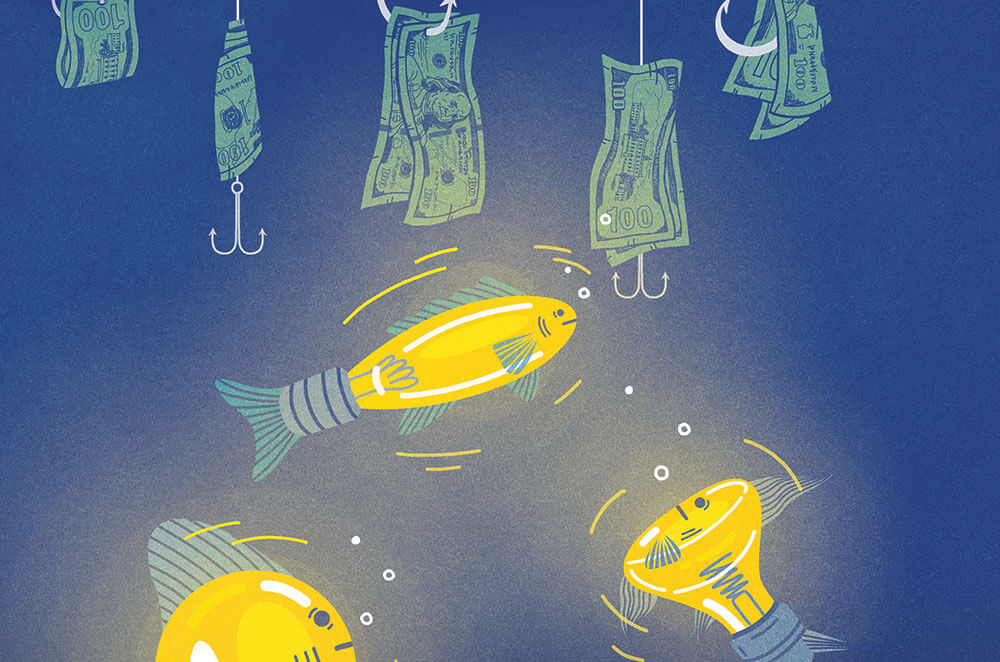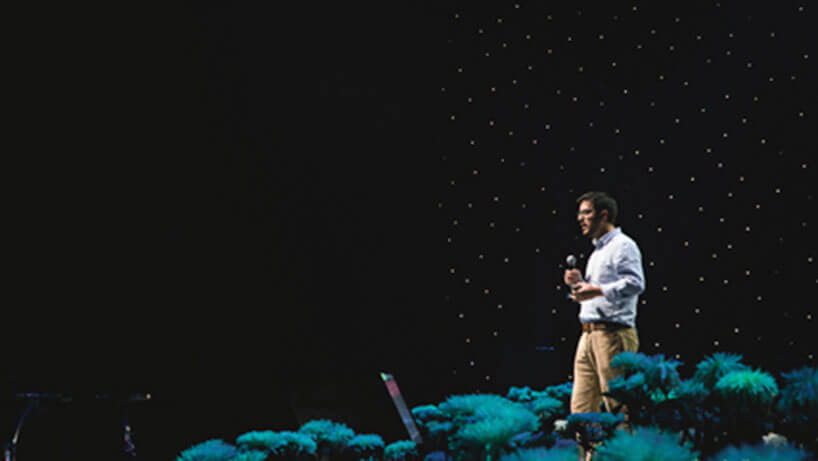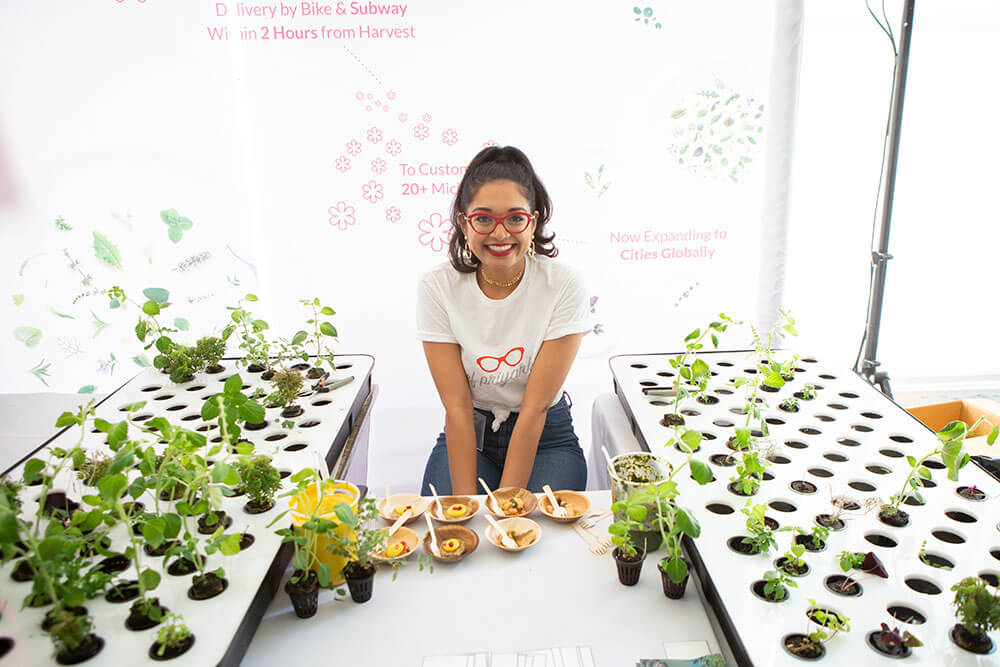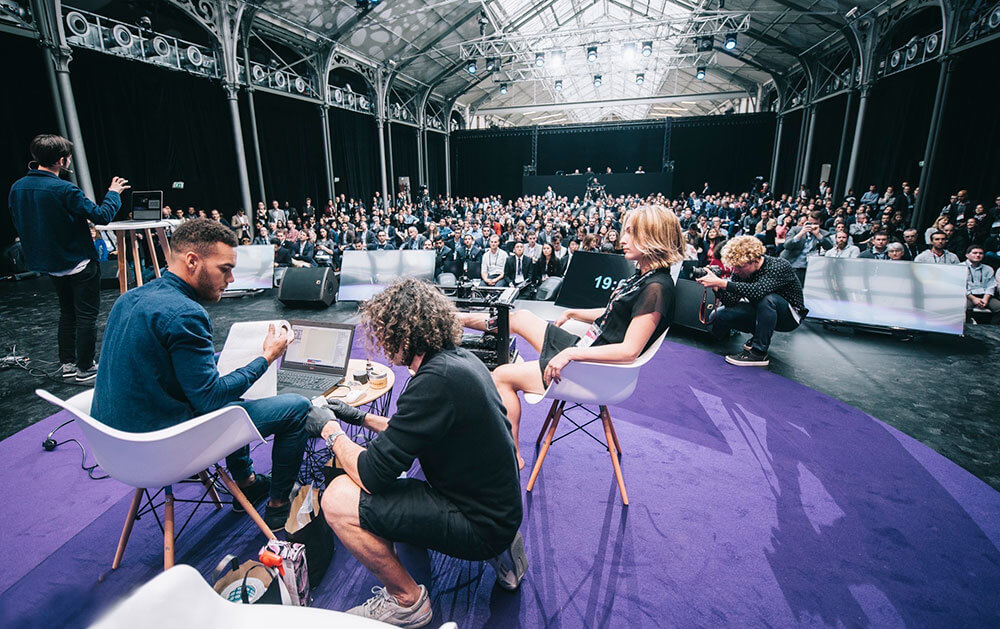
The next wave of breakthrough innovations will bring startups and business events together. (Illustration/Pui Yan Fong)
It’s not a big surprise that the 55,000 attendees at Web Summit, a global technology conference in November in Lisbon, Portugal, could encounter pitches — brief talks where startup founders and entrepreneurs present their most innovative and investment-worthy ideas — at almost any hour of the day. At the summit, which organizers describe as “a crossroads for the world’s largest buyers and sellers of technology,” pitches were even scheduled over breakfasts and lunches. One-hundred-seventy startups competed over three days to be named the winner of Web Summit’s PITCH competition, which came with a prize of 100,000 euros in venture-capital funding. Hundreds of startup founders met face-to-face with potential investors during prescheduled “investor office hours” or met more casually in “investor lounges” or at networking events.
It’s less expected, perhaps, to find startups on the agenda at the annual meeting of the 124-year-old Association of Equipment Manufacturers (AEM), a trade association for manufacturers of heavy equipment used in industries known more for gravel, corn, and coal than computer code.
“As things move to data, we become less an old traditional industry and more of a New-Age one,” said Al Cervero, AEM’s senior vice president for construction, mining, and utility. “A single machine is going to be producing — and is already producing — so much data that so many of our companies need to reconfigure when they’re looking for mechanical, electrical, and structural engineers. They’ve got to start looking at data scientists.”
The question is, Cervero told Convene, “how do we get the old traditional users of this equipment to start utilizing the new tools that are available to them?”
Part of AEM’s solution, which it tried out at its 2018 Annual Meeting in November in southern California, was to ask a dozen startups working in the construction and agricultural sectors to attend the program, which included a talk by Ganesh Bell. Bell is the president of Uptake, a software development company launched by the co-founders of Groupon and specializing in applying artificial intelligence (AI) and the Internet of Things to industry. The startups were invited for the first time at the 2018 event, Cervero said, “to come and talk about why there is all this new money and these new startups coming into this old industry.”

Hello Tomorrow’s deep-tech entrepreneurs find connections as well as funding at the Hello Tomorrow Global Challenge. (Photo/Arthur Kostadinoff)
New Capital, News Ideas
“There is money everywhere,” wrote Crunchbase, a business intelligence company, in a report on global venture capital released last July. The amount of venture capital invested through the first half of 2018 — estimated at $175 billion — already had exceeded the annual totals of the years between 2002 and 2016, Crunchbase wrote.
Along with the rise in venture capital, there has been a corresponding increase in business events that explicitly define a role for themselves as connectors of money and innovation, and are carving out a place for themselves in established verticals.
Last May, when the HLTH conference debuted at the MGM Grand in Las Vegas, organizers filled its panels with the founders and CEOs of startups and companies working in AI, blockchain, data liquidity, virtual care, and other areas related to the future of health care. Of the nearly 3,500 attendees, more than 300 were investors. HLTH set out to be a “must-attend health ecosystem conference where all major stakeholders share new solutions and strategies,” and “where key business-to-business exchanges take place,” said its founder and CEO, Jonathan Weiner.
Weiner previously founded Money2020, a conference organized around financial-services technology companies, known as fintech, and financial institutions, and now held in Asia, Europe, and the U.S. One of its highlights is what it touts as the world’s largest hackathon devoted to fintech. At the end of the 24-hour-long hackathon, participating teams get two minutes to pitch their ideas. The winners receive cash prizes and the chance to present a five-minute pitch on the conference’s main stage.
Web Summit’s organizers also produce another fintech event, the invitation-only MoneyConf in Dublin, Ireland, where opportunities for attendees to connect with venture capital are an integral part of the program. On MoneyConf’s website, visitors can browse through rows of headshots of investors who will attend, in the same way that traditional conferences might picture the event’s main speakers. MoneyConf’s organizers describe the conference as “a space where technology meets money, money meets people, people meet ideas, and ideas become reality.”
“Tech started out as its own industry and its own economy, but now tech is just a part of every industry,” said Gillian Rago, a marketing associate for Rabobank, a Netherlands-based bank that produces pitch competitions called Foodbytes! by Rabobank. “We’ve started to see that switch happen, where [technology] is just ever-present.”
Rago was an exhibitor at Food Loves Tech, a two-day conference in November in the Industry City business park in south Brooklyn, New York, where the session topics and panelists served to prove her point. On a panel about next-generation food technology, Deepak Sekar, founder and CEO of Chowbotics, introduced Sally, a robot that can assemble a 21-ingredient salad in under a minute. In another session, Matt Jozwiak, founder and executive director of the nonprofit food recovery organization Rethink Food NYC Inc. talked about how data is helping large-scale food operations track the kinds and amounts of food that don’t get consumed so it doesn’t get prepared in the first place. And on a panel that asked the question, “What Can Tech Do For Restaurants?” Ayr Muir, founder and CEO of Clover Food Lab, a chain of vegetarian restaurants in Boston, described how new online payment systems are freeing servers from the “psychological moat” of cash registers. At Clover Food Lab, servers are called guides and don’t stand behind a counter.
Rago’s employer, the Rabobank Group, is one of the largest banks in the world and grew out of a network of farmers’ lending cooperatives founded in the 19th century in the Netherlands’ food-growing regions. The institution is now a global leader in food and agriculture financing and launched Foodbytes! as a way to uncover early-stage startup companies as investment opportunities.
The event started in San Francisco as “a casual, networking/mixer type event,” Rago said. “It was kind of like, ‘Let’s just get some of these people in the same rooms and see how the conversations go.’ From there, it’s evolved to a two-day event, centered around a formal pitch competition with high-production values, Rago said. In addition to the competition, finalists have the opportunity to have one-on-ones with mentors and judges, who advise them on strategy, she added. Rabobank has held more than a dozen events to date, in cities including New York City, Montreal, London, Sydney, and Boulder, Colorado.
Expanding the pitch competition formats into a conference-style event “makes a ton of sense,” Rago said, with one caveat: “It depends on how the events are curated.” In the best cases, “you have experts from a variety of different backgrounds, who are coming together under one industry. With such a wealth of knowledge in one room, you can cover so much ground in such a short amount of time as well as inspire the people who are there. The benefits are tenfold.”
At Rabobank, “we’ve seen growth as a result of these pitch competitions and festivals,” Rago said, “which is why we are seeing so much of it. It’s for people who want to connect and help one another.”

Conference swag includes live herbs at the Food Loves Tech conference in Brooklyn.
‘A Very Friendly Atmosphere’
In 2011, two French Ph.D. students founded a nonprofit called Science, Innovation & Entrepreneurship, on the premise that the resources needed to accelerate world-changing technologies were not the same as those that were fueling web and mobile innovations. In 2014, the organization, renamed Hello Tomorrow, launched the first Hello Tomorrow Global Challenge, inviting founders of early-stage startups to pitch their ideas and compete for 100,000 euros in funding.
Today, thousands of scientists and entrepreneurs apply annually to Hello Tomorrow’s Global Challenge, which offers winners prize money that has grown to 265,000 euros in 12 tracks, along with a chance to pitch on the main stage at the Hello Tomorrow Global Summit, held each March in Paris. Those who pitch also have opportunities to meet one-on-one with some of the 200 international investors who attend the event, who are joined by academics, policy makers, and others.
The nonprofit association puts its focus on what it describes as “deep tech” — transformative breakthroughs that require more time and greater funding to develop, but make a deeper impact than innovations in the digital economy, explained co-director Sarah Pedroza. The Challenge’s 12 tracks include aeronautics, data and AI; digital health; energy; food, agriculture and environment; global health; industrial bio-tech; industry 4.0; new materials; new mobility; new space; and wellbeing.
Participants “might imagine new materials, or new ways of moving or eating,” she said. What they share in common is “an unprecedented capability to solve major issues that we have today.”
For attendees, the summit “really expands your perception of the world you are living in and the way of your life in the future,” Pedroza said. “Basically, you are supposed to be amazed. You’re supposed to say, ‘No way this exists already! This prototype could be in the market within the next year and it could change drastically the way we do everything.’ We want to show that for the main challenges we are facing as humankind, there are already solutions. We want to bring awareness to these new solutions that are coming — this is what the challenge pitches are for.”
Related: How Organizations Can Launch Pitchfest Competition of Their Own
Pedroza joined the organization earlier this year from the Boston Consulting Group, where she advised entrepreneurs on growth strategies in the social business group, which focuses on solving social problems. Since her arrival, Pedroza has put new energy into building an ecosystem around the participating entrepreneurs, including creating building a grassroots network of competitions in 11 countries, Pakistan and Ghana among them.
Innovation “is not happening only in Silicon Valley or Boston,” Pedroza said. “There are amazing projects coming from Africa, from Pakistan, from India, and many countries.” Although the global ecosystem knows no borders, “the resources available, the policies that are put in place, and the infrastructure are very, very different from one place to the other,” she said. “So, the chance to succeed for entrepreneurs is really different.”
The winner of each local final receives funding and the opportunity fly to Paris and to pitch during the global summit.
“We want to be much more than an event and a competition,” she said. “We’re trying much more to help participants connect with businesses and public authorities — all these stakeholders that can bring them key resources. What we believe is that deep-tech entrepreneurs will never be able to make it on their own. We see it as much bigger than that.”
Entrepreneurs working in deep tech typically are “building something radically new, so nobody paves the way for them,” Pedroza said. “We want to bring a sense of being in a very friendly atmosphere, with like-minded people who also chase [radically new solutions]. Deep-tech entrepreneurs feel that they are not alone anymore. So, that is the key when you’re going to the summit — you are not just standing at an event, you are part of the family.”

A brave soul gets the world’s first live tattoo by a robot at the Hello Tomorrow Global Summit. (Nicolas Jacquemin/La Clef)
Collaboration Is The ‘Secret Sauce’ For Startups
“This is an incredible moment for innovation,” wrote Chandra Gnanasambandam and Michael Uhl in a 2017 Harvard Business Review (HBR) article, “when improbable advances are real possibilities.” However, the requirements for innovation today are entirely different from those of the last 30 years, they wrote in the HBR article, “Innovation Is as Much About Finding Partners as Building Products.”
More than new technology alone, “collaboration is the essential, new, secret sauce for startups and industry leaders alike,” they wrote. Instead of funding and incubating startups solely to disrupt existing players, Gnanasambandam and Uhl proposed a new model, linking new technologies, talent, and the leaders of traditional industries, to minimize the weaknesses and leverage the strengths of all three.
That blend sounds like good news for business events — and a lot like the first-ever “Tech Experience” zone which Cervero and AEM colleagues created in 2017 at the biennial CONEXPO-CON/AGG, the massive exhibition and trade show showcasing such traditional construction industry sectors as concrete, earth-moving, and mining. AEM hired a futurist to help design the 750,000-square-foot pavilion, which featured robots, drones, autonomous vehicles, smart systems, advanced materials, and simulation training. The Tech Zone was also where finalists in a global competition to design a transportation system for the future pitched their ideas in front of judges and a live audience. The Tech Experience won awards, as well as heavy foot traffic from the show’s 138,000 attendees.
Cervero currently is at work planning a new Tech Experience for the 2019 CONEXPO-CON/AGG. He’s looking at three different areas — modern mobility, smart cities, and sustainable building — that members can engage with, he said.
“And we’re taking those three concepts and building them out into a story to talk about what could be, what will be, and what do the customers need to do to take a first step.” Plans are being drawn up for a park with food trucks, places to relax, and a stage for pop-up tech talks, he said.
“That’ll be where the startups will have an opportunity to set up shop, so that they can be there to talk with folks.”
The changes are “really a combination of building awareness, driving adoption [of new technology], and creating a new industry young people want to get into,” Cervero said. And to transform “a show [where attendees] have traditionally thought, ‘Oh we’re just going to go and look at new iron,’ to a show that is producing new solutions.”
More from our December cover story
Women Who Tech Working to Get Funding for Women-Led Startups
TEST TIME
Earn one clock hour of certification credit by reading this story and sidebars, and reading the Harvard Business Review article, “Innovation Is as Much About Finding Partners as Building Products.”
To earn certification clock hours, visit pcma.org/convene-cmp-series to answer questions about information contained in this CMP Series article and the additional material.
The Certified Meeting Professional (CMP) is a registered trademark of the Events Industry Council.
